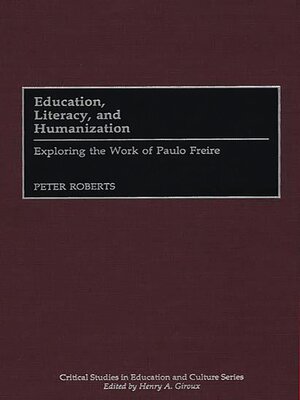Education, Literacy, and Humanization
ebook ∣ Exploring the Work of Paulo Freire · Critical Studies in Education and Culture Series
By Peter Roberts

Sign up to save your library
With an OverDrive account, you can save your favorite libraries for at-a-glance information about availability. Find out more about OverDrive accounts.
Find this title in Libby, the library reading app by OverDrive.



Search for a digital library with this title
Title found at these libraries:
| Library Name | Distance |
|---|---|
| Loading... |
The author adopts a holistic approach in exploring the ontological, epistemological, ethical, and pedagogical dimensions of Paulo Freire's thought. The book discusses Freire's approach to adult literacy education and investigates the political, dialogical, and critical aspects to the multidimensional word in Freirean theory.
The author outlines and assesses a number of key critiques of Freire's modernism, concentrating in particular on questions pertaining to the problem of pedagogical intervention. He responds at some length to C.A. Bowers, one of Freire's most important and persistent critics, and finds fault with behaviorist, stage-based accounts of consciousness raising. The Freirean concept of conscientization is reinterpreted in light of the postmodern notion of multiple subjectivities. From this book, Freire emerges as a complex educational figure: a thinker and teacher deeply committed to the universalist ideal of humanization, yet also wary of some of the exaggerated certainties of modernism. His work, for all its flaws and contradictions, remains highly influential and stands opposed to technicist and neoliberal tendencies in recent educational reform initiatives.
The author outlines and assesses a number of key critiques of Freire's modernism, concentrating in particular on questions pertaining to the problem of pedagogical intervention. He responds at some length to C.A. Bowers, one of Freire's most important and persistent critics, and finds fault with behaviorist, stage-based accounts of consciousness raising. The Freirean concept of conscientization is reinterpreted in light of the postmodern notion of multiple subjectivities. From this book, Freire emerges as a complex educational figure: a thinker and teacher deeply committed to the universalist ideal of humanization, yet also wary of some of the exaggerated certainties of modernism. His work, for all its flaws and contradictions, remains highly influential and stands opposed to technicist and neoliberal tendencies in recent educational reform initiatives.







